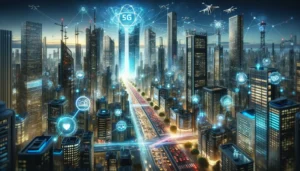In an increasingly connected world, mobile network technology has been a driving force behind significant innovations across multiple industries. The launch of 5G, the fifth generation of r technologymobile networks, marks the beginning of a new era in mobile communication, promising profound transformations that go far beyond simple phone calls and text messages.
This blogpost explores the implications of 5G and the future of networking technologies, highlighting the revolutionary connection speeds and significant reduction in latency. We cover how these advancements not only improve the user experience, but also enable innovations in critical areas like the Internet of Things (IoT), autonomous vehicles, and more, promising a sweeping transformation in the way we live and work.
Unprecedented Speeds
One of the most discussed features of 5G is its ability to offer significantly faster internet speeds compared to 4G networks. We're talking about download speeds that can exceed 1 Gbps under ideal conditions, an improvement that not only enhances the user experience in everyday activities like video streaming and online gaming.
But it also opens doors to more bandwidth-demanding applications, enabling significant advances in sectors such as telemedicine and online education. These incredible speeds have the potential to revolutionize the way we consume content, making things like 8K videos and virtual reality more accessible and immersive, as well as enabling real-time interactive experiences.
Latency Reduced to a Minimum
The drastic reduction in latency promised by 5G could be more transformative than the increase in speeds, making the travel time of a data packet almost imperceptible. This improvement is crucial for applications that rely on real-time responses, such as online games, where it results in more responsive gameplay. However, the impact of this advance extends far beyond entertainment, affecting several other areas.

Enabling IoT at Scale
The promise of 5G to efficiently connect billions of devices simultaneously opens new horizons for the Internet of Things (IoT). With increased speed and capacity, combined with very low latency, 5G can connect everything from home appliances and wearables to industrial sensors.
This not only makes our homes smarter and our industries more efficient through automation and real-time monitoring, but it also unlocks the potential for new IoT applications. Applications that were previously unimaginable due to the limitations of previous technologies have now become possible, opening up a range of innovations in different sectors.
Revolution in Autonomous Vehicles
Autonomous vehicles are another area that will benefit greatly from the deployment of 5G. The ability of these vehicles to communicate with each other and the infrastructure around them (V2X) in real time is crucial to their safety and effectiveness. With the minimized latency and improved bandwidth of 5G, autonomous vehicles can make faster, more accurate decisions, which is vital for preventing accidents and optimizing traffic flow.
Beyond 5G: The Future of Mobile Networks
While 5G is still in its early stages of deployment, researchers are already looking to the future, exploring what could come next. Concepts such as 6G are already being discussed, promising even faster speeds, even lower latencies and capabilities that could include very high frequency communications and even the integration of artificial intelligence into the networks themselves to optimize resource allocation and traffic management.
Final considerations
The arrival of 5G is a milestone in the evolution of mobile networks, bringing with it transformative potential not only for mobile communication, but for countless areas of everyday life and the global economy. Unprecedented speeds, reduced latency and improved capacity promise a new era of innovation in IoT, autonomous vehicles and more.
As we look to the future, it is clear that mobile networks will continue to be a fundamental pillar in building a more connected and innovative world. The 5G journey has just begun, and the possibilities that will unfold as we move to 6G and beyond are as exciting as they are limitless.
